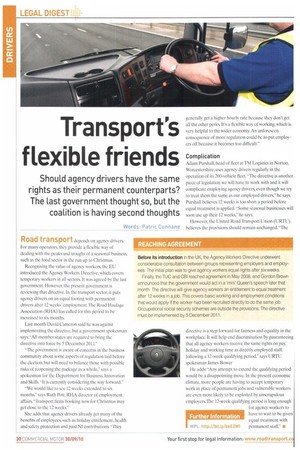Transport's flexible friends
Page 30

If you've noticed an error in this article please click here to report it so we can fix it.
Should agency drivers have the same rights as their permanent counterparts? The last government thought sop but the coalition is having second thoughts
Words: Patric Cunnane
Road transport depends on agency drivers. For many operators, they provide a flexible way of dealing with the peaks and troughs of a seasonal business, such as the food sector in the run up to Christmas.
Recognising the value of agency workers, the EU introduced the Agency Workers Directive, which covers temporary workers in all sectors It was agreed by the last government However, the present government is reviewing that directive. In the transport sector. it puts agency drivers on an equal footing with permanent drivers after 12 weeks' employment.The Road Haulage Association (RHA) has called for this period to be increased to six months.
Last month David Cameron said he was against implementing the directive, but a government spokesman says: "All member states arc required to bring the directive into force by 5 December 2011."
"The government is aware of concerns in the business community about some aspects of regulation laid before the election, but will need to balance those with possible risks of reopening the package as a whole," says a spokesman for the Department for Business, Innovation and Skills. "It is currently considering the way forward."
"We would like to sec 12 weeks extended to six months," says Ruth Pott, RHA director of employment affairs. "Transport firms booking now for Christmas may get close to the 12 weeks."
She adds that agency drivers already get many of the benefits of employees, such as holiday entitlement, health and safety protection and paid NI contributions. "They generally get a higher hourly rate because they don't get all the other perks. It's a flexible way of working, which is very helpful to the wider economy. An unforeseen consequence of more regulation could be to put employers off because it becomes too difficult."
Complication
Adam Purshall, head of fleet at TM Logistics in Norton, Worcestershire, uses agency drivers regularly in the operation of its 200-vehicle fleet. "The directive is another piece of legislation we will have to work with and it will complicate employing agency drivers, even though we try to treat them the same as our employed drivers," he says. Purshall believes 12 weeks is too short a period before equal treatment is applied. 'Some seasonal businesses will soon use up their 12 weeks," he says.
However, the United Road Transport Union (URTU) believes the provisions should remain unchanged. "The directive is a step forward for fairness and equality in the workplace. It will help end discrimination by guaranteeing that all agency workers receive the same rights on pay, holiday and working time as directly employed staff, following a 12-week qualifying period," says URTU spokesman James Bower He adds: "Any attempt to extend the qualifying period would be a disappointing move. In the present economic climate, more people are having to accept temporary work in place of permanent jobs and vulnerable workers are even more likely to be exploited by unscrupulous employers. The 12-week qualifying period is long enough for agency workers to have to wait to be given equal treatment with
WPL: http://bitlyibeE2W1 permanent staff."
Further Information




























































































































